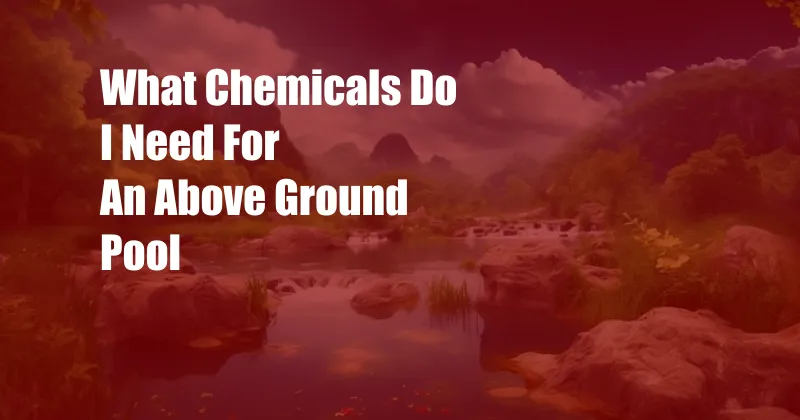
What Chemicals Do I Need for an Above Ground Pool: A Comprehensive Guide
Imagine the joy of cooling off on a hot summer day in your own backyard oasis. An above-ground pool is a fantastic way to create that perfect escape. But to keep your pool sparkling clean and safe for swimming, you’ll need a few essential chemicals.
Chemical Essentials for Above Ground Pools
1. Chlorine or Bromine:
These chemicals are the backbone of pool sanitation. They kill bacteria and other microorganisms that can cause skin infections, respiratory problems, and other waterborne diseases. Chlorine is the most common choice, but bromine is a gentler alternative that can be less irritating to sensitive skin.
2. pH Balancer:
The pH level of your pool water should be between 7.2 and 7.8. This range ensures that the chlorine or bromine is effective in killing pathogens and prevents the water from becoming corrosive or scaling the pool liner.
3. Alkalinity Adjuster:
Alkalinity is a measure of the amount of dissolved minerals in the water. It helps stabilize the pH level and prevents cloudy water.
4. Calcium Hardness Increaser:
Calcium hardness is an essential mineral for your pool’s plaster or concrete finish. It prevents the finish from leaching calcium into the water, which can cause a cloudy appearance and damage the finish.
5. Algaecide:
Algae is a common problem in above-ground pools. Algaecides prevent and kill algae growth, keeping your pool water crystal clear.
Dosages and Calculations
The amount of each chemical you need will depend on the size of your pool, the chemical type, and the current water balance. Follow the manufacturer’s instructions carefully, as overdosing can be harmful.
Expert Tips for Chemical Management
- Test your pool water regularly: Use a test kit to monitor pH, alkalinity, and chlorine or bromine levels.
- Keep your pool covered: This helps reduce chemical evaporation and prevents debris from entering the water.
- Adjust chemicals gradually: Don’t add too much of any chemical at once. Test the water after each adjustment and wait at least 20 minutes for the chemicals to dissolve.
- Shock your pool regularly: Shocking is a process of adding a high dose of chlorine or bromine to kill bacteria and other contaminants. Follow the manufacturer’s directions.
FAQs on Above Ground Pool Chemicals
Q: How often should I add chemicals to my pool?
A: The frequency will depend on the size of your pool and how often it’s used. Typically, you’ll need to add chlorine or bromine daily, test the water every few days, and adjust pH and alkalinity as needed.
Q: Can I use chlorine tablets in an above-ground pool?
A: Yes, but use a floating dispenser to prevent the tablets from settling on the bottom of the pool and damaging the liner.
Q: What happens if I don’t balance my pool water?
A: Imbalanced pool water can cause a variety of problems, including cloudy water, skin irritation, and damage to your pool’s equipment.
Conclusion
Keeping your above-ground pool chemically balanced is essential for a safe and enjoyable swimming experience. By following the guidelines outlined in this article and incorporating the expert advice provided, you can ensure that your pool water remains crystal clear and healthy for the entire season.
Are you ready to make the most of your backyard oasis? Get all the chemicals you need and start enjoying your above-ground pool today!